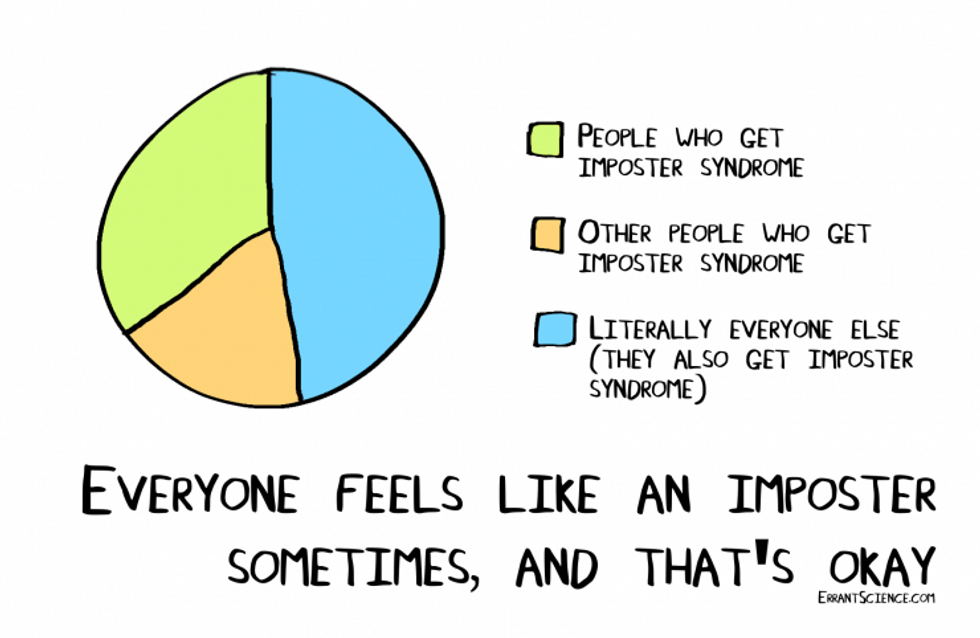Imposter Syndrome: What Does it Mean and How Can You Fight It?
Let's go over what imposter syndrome is, what causes it, and how we can defeat it together.

Do you ever feel like you don't fit in? Like the work you do will never be good enough? Even when you have success, you're not sure you deserve it?
This feeling is called "imposter syndrome," and it affects millions of people across the globe and... it's especially nasty in Hollywood. Today, I want to go over the idea of this state of mind and tackle how it works in Hollywood. We'll use it to see the inspiration for characters, self-doubt, and try to find a way to deal with it together.
Imposter Syndrome: Meaning and Causes
Living in the modern era means that there are people diagnosing and coming up with names for a lot of the things that were undefinable before. Not only will this make us healthier film and tv makers, but it also eases my mind to know other people deal with similar things.
In Hollywood, there's a saying: "Fake it till you make it. " While I think that's generally good advice when you need to build a career and confidence, I don't think it helps people dealing with imposter syndrome.
Imposter Syndrome Meaning
Imposter syndrome is defined as a collection of feelings of inadequacy that continue, even when success is present. It's a form of chronic self-doubt that makes people unable to internalize their external accomplishments.
People who work in Hollywood can have the perception of success, but I've found a lot of people think they're failures. Especially when constantly measures against others. Imposter syndrome doesn’t equate with low self-esteem or a lack of self-confidence, it actually derives from a desire for perfection and the inability to achieve said perfection even with the grandest efforts.
Imposter Syndrome Causes
So how do we develop imposter syndrome?
Some people blame parents labeling their kids as "smart" or "special." While others feel like this is a societal problem that's risen with the rise of social media, rankings, and our general understanding of privilege and the world.
Whatever the case, it's a serious issue plaguing lots of creatives.
Check out this imposter syndrome test!

Imposter Syndrome in Character Archetypes
Character archetypes are great ways to develop characters from the ground up. Writing a character with imposter syndrome can be hard, but it's done more frequently than you think. I wanted to look at a few examples of characters that are plagued with this ailment.
Some imposter Character Traits would be:
1. Perfectionist
Think Tracey Flick from Election.
Someone who wants everything to give the appearance of it all being fine. Of being in total control, even though they might be crumbling on the inside. These kinds of characters need to be special and are desperate for the world to embrace them so they don't feel so left out.
2. Superman/Superwoman
What would happen if you had all the power in the world but were not sure how to use it?
Characters like Superman -- or even Captain America -- are imbued with great strengths, but cannot always save the people around them. They may not feel like heroes, but their arcs often involve them dealing with that issue to do something heroic.
3. A Genius
Sticking with the hero theme, think about Tony Stark. He was a genius living in his father's shadow an unsure his place in society. The first Iron Man was about him atoning for these sins. Doing all he can to feel like a hero in the suit and not a fraud.
The burden of genius is that people rely on you and you can let them down.
Plus, if you meet people smarter than you, you might not be able to stand it.
4. An Expert
One of my favorite movies is Arrival. In it, we follow an expert who's trying to translate alien language. Expert linguist Louise Banks is not sure she should be there, but in the movie, she's trying to prove why she's the person who should be there, not a bunch of military guys,
Perhaps the most influential imposter syndrome character is Don Draper.
Don Draper's meta imposter syndrome
Don Draper is an actual imposter.
Dick Whitman took on the Don Draper identity, stealing the name of a guy he served with during the war. He's also a guy who cheats, smokes, drinks, is self-destructive, and still somehow is seen as the very best an Ad-man can be.
Don is always shirking off accolades. He wins Clios and doesn't take much pride in them. He's constantly trying to prove he belongs at the table even when he achieves the highest honors.
And in the final season, when he joins ad firm McCann and realizes he's not special at all, he just runs. He runs and runs until he comes back with the greatest advertisement of all time.
Because he's Don Draper.
How to Combat Imposter Syndrome in Hollywood
That's all how fictional characters use the idea, but how do we combat imposter syndrome in our own lives?
Day by day.
The truth is, there's no cure-all for this idea. Even Oscar winners battle with whether or not they belong inside the padded walls of the Hollywood asylum. If you are lucky enough to work in this town remember that you made it for a reason.
People trust and love your work. So you need to trust and love yourself.
You are better than you think you are. You are smarter than you think you are. You know more than you give yourself credit for.
Remind yourself of that daily, and find a friend group can solidify it for you as well.
Hopefully, we are fostering that here at No Film School.
Got a few ways to battle imposter syndrome? Leave them in the comments. And use that space to build one another up. This town is built on connections and friendships, so find them, support them, and make great things.
I can't wait to see what you create next.
What's next? Get happy with some writing advice!
I have been writing professionally since Shovel Buddies sold in 2015. Some years it pays all my bills. Other years I do a ton of side jobs to make ends meet. Still, I can call myself a writer, and I always thought that would be the dream. But I want to tell you about how I had to encounter that dream head-on recently, and what I learned from that experience.
Click to learn more!













